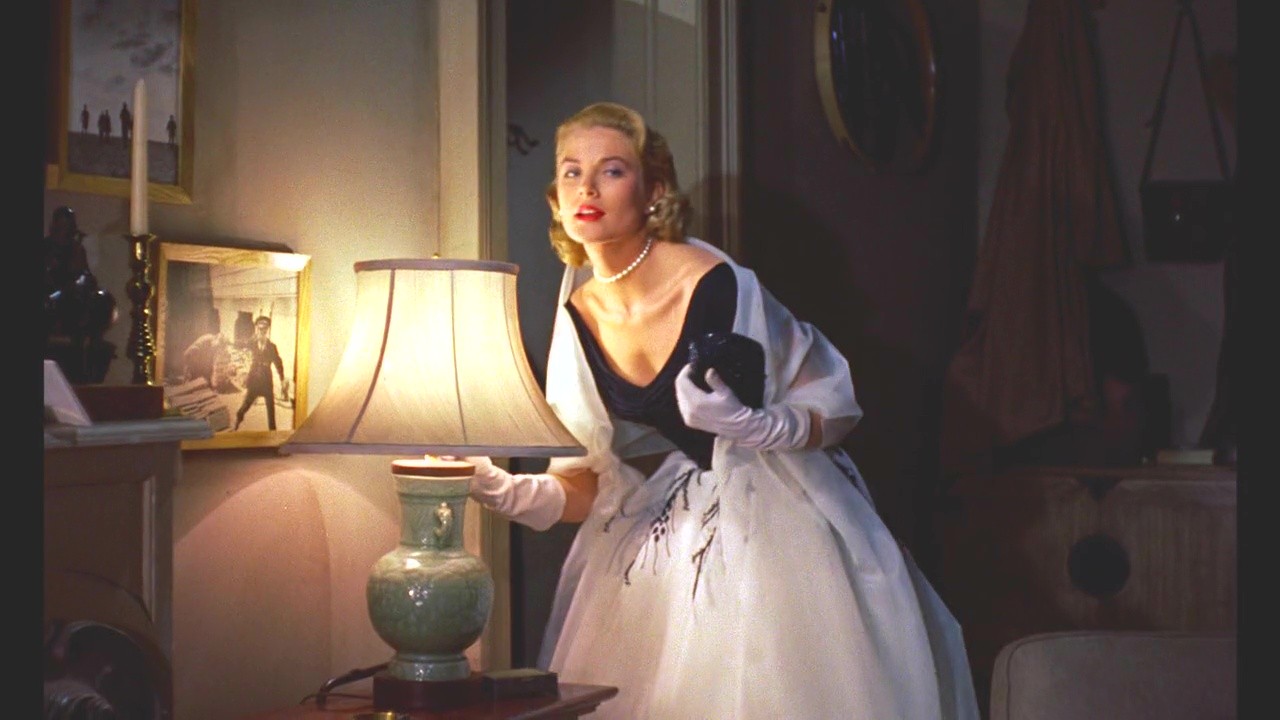
Grace Kelly as Lisa Fremont in Rear Window.
Molly Wexler is a longtime Indie Memphis board member who recently decided to try her hand at making films herself. Her documentary, The Little Tea Shop, recently aired on WKNO, and will play at the upcoming Nashville Film Festival, the Portland Short Film Festival, and the Australian Muslim Film Festival. For Never Seen It, the first-time director and producer chose one of the greatest films ever made, Alfred Hitchcock’s 1954 masterpiece Rear Window.
Chris McCoy: What do you know about Rear Window?
Molly Wexler: I know it’s a classic movie from the 1950s starring Jimmy Stewart and Grace Kelly. It’s one of Hitchcock’s most famous, and on many, many people’s top movies of all time lists.
Chris: Do you like Alfred Hitchcock movies? Generally?
Molly: I’m so embarrassed to say this. This is my first Alfred Hitchcock movie. I haven’t seen any other ones. I’m mortified saying that.
Chris: Well, we’re going to have a good conversation, then! I’m excited.
Molly: You know, I’m so involved with Indie Memphis, and I love independent film, and I’ve taken a film class before and stuff, but somehow I missed that whole Alfred Hitchcock thing. And honestly, for a long time, that really wasn’t my jam. But lately, I’ve been way more into mysteries, and thrillers, and horror, and just that whole genre of movies that I hadn’t explored before. So it’s time for me to explore Hitchcock and I’m excited to do that in a very public way.
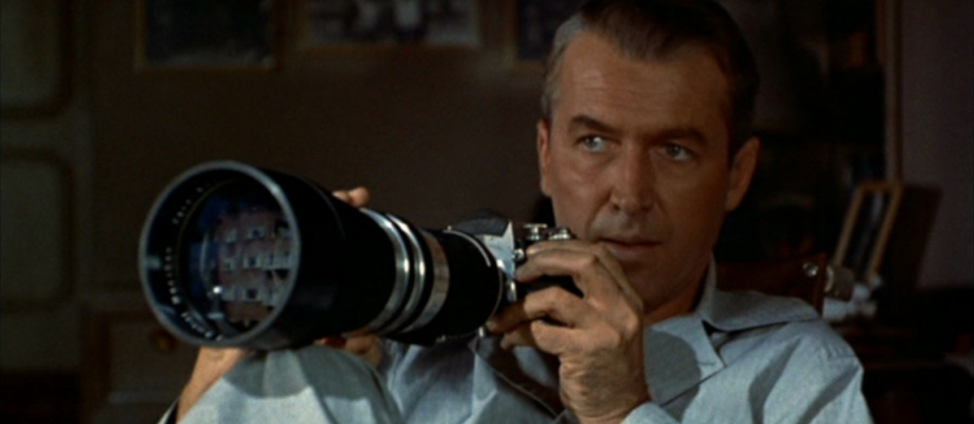
112 minutes later…
Chris: Molly Wexler, you are now someone who has seen Rear Window. What did you think?
Molly: I think when you hear Hitchcock … and by the way, I’m almost positive, when I thought back on it, that I’ve seen Psycho, but so long ago. But I may have just seen enough scenes from it to think I’ve seen it. But I’m going to rewatch it. So, Hitchcock. You know, certain things come to mind. I went in with certain expectations. I thought I was going to be black and white. So, right off the bat, I was shocked that it was colorful and sort of lighter. I was expecting dark and heavy and intense. It didn’t feel like that to me. It just felt different than I thought it was going to feel. Jimmy Stewart, my God! He’s so good! And Grace Kelly is iconic.
Never Seen It: Watching Rear Window with Director Molly Wexler (3)
Chris: Has anybody ever been as beautiful as she was?
Molly: She cannot be real. I love her accent, the way she enunciates. Just what is that? The only other person who talks like that is like Moira from Schitt’s Creek.
Chris: I hit Wikipedia right after I finished watching this time because I’m always so enthralled with her. Rear Window is from 1954. That year, she did three movies: this movie, Dial M for Murder, which is also a Hitchcock movie, and a movie called The Country Girl, which no one ever watches anymore. But she won the Best Actress Oscar for The Country Girl, beating out Judy Garland for A Star Is Born.
Molly: God!
Chris: I mean, that’s a good year. And then, the next year at Cannes, she met Prince Rainier and became actual royalty.
Molly: Legendary. And Jimmy Stewart! He’s so cool.
Chris: He’s in full grumpy Jimmy Stewart mode.
Molly: Oh, I know! And I loved that because it was just exactly how he’s supposed to be. As opposed to the predisposed expectations I had for Hitchcock. Jimmy Stewart lived up to everything, whereas Hitchcock was shocking me a bit.
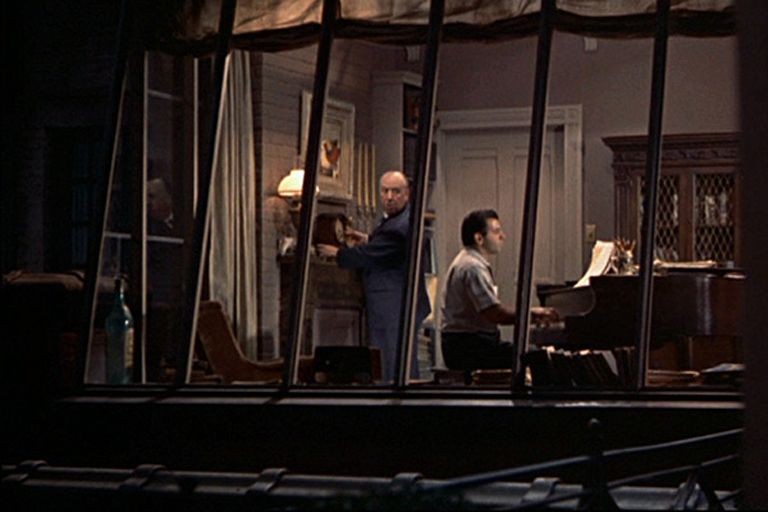
Alfred Hitchcock’s cameo in Rear Window.
Chris: As you were saying, there’s a lot more emotional variation in this film than in a normal thriller.
Molly: Exactly. I expected to have much more of an air of suspense and foreboding. I knew the premise, that he was stuck home in his apartment, which was kind of why I wanted to pick this movie, because of all of us being stuck at home because of the pandemic. I felt like people could really relate to that now. Especially for people who live in apartment buildings or in big cities. You hear that all the time, how hard it’s been for people in New York and places where they’re in these tiny apartments. They just say basically, you know, other than TV or the internet — he had the radio — other than that, what is there to do besides look out the window?
Chris: He doesn’t own a TV.
Molly: I guess the differences that his neighbors can still socialize, even though he can’t.
Chris: I feel like this movie is about mass media. It’s about television, which was still new then, to a certain extent. But it’s also about the movies.
Molly: It’s about that sort of voyeuristic tendency that we all have.
Chris: I think that the thing that really connected with me this time is the true crime trend.
Molly: It’s the first movie that’s about reality television, or that could be spun into a reality TV situation.
Chris: They become amateur detectives, trying to figure it all out. What’s fascinating to them about Thorwald? About all these people that they’re watching across the way? This is real, and there’s a mystery. They’re prying into these people’s personal lives. That, to me, is kind of the same thing that you get from like … I don’t know, like Gone Girl, for example.
Molly: That’s true. Yeah.
Chris: Except Gone Girl was a fictional thing. … Okay, Tiger King. Those are real people, and you’re really prying into their lives. You’re just getting little dribbles of information about these real people, and you’re trying to make a moral judgment about them. “Did Carole Baskin kill her husband?” is the same as, “Did Roger Thorwald kill his wife?”
Molly: Right. Exactly. Lisa is the one that says, “I’m not up on my rear window ethics.” I thought the writing was really well done.
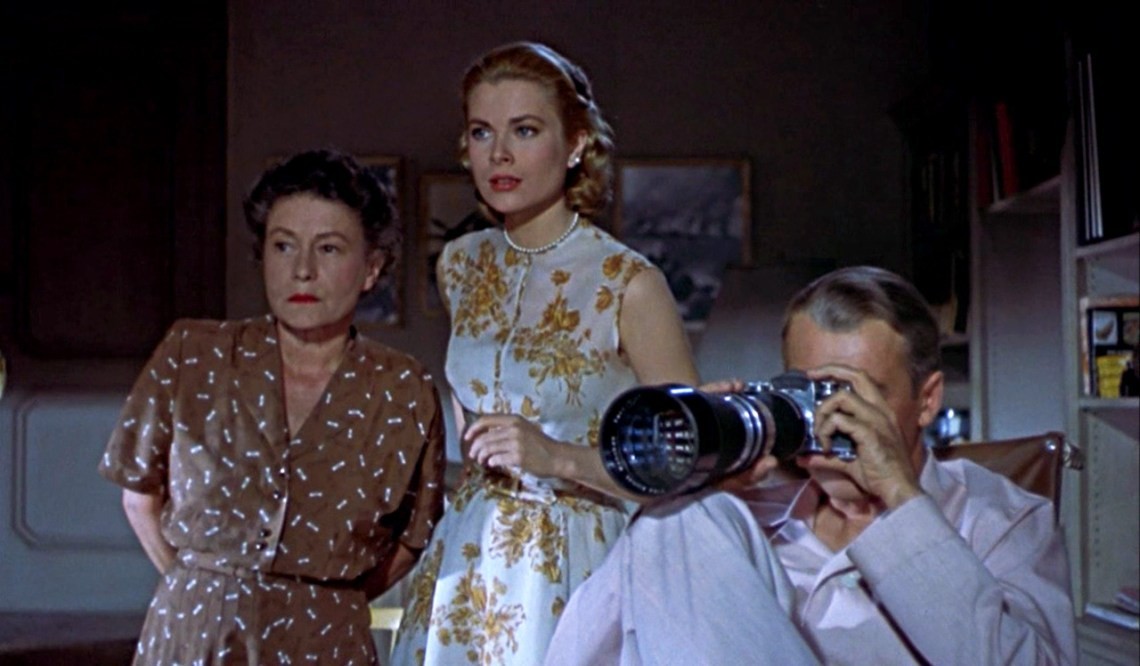
Thelma Ritter as Stella, Grace Kelly as Lisa, and Jimmy Stewart as Jeff.
Chris: The first half-hour is like a rom-com.
Molly: That’s where I was totally thrown off. That’s what I was going to say to you actually, that in the beginning, especially when Stella comes in and she’s funny. They have a real cute dynamic. I’m like, “What is this? This is not what I thought it was going to be at all!” But I knew it was going to go in a different direction, and there was a mystery aspect. I knew there was a murder, or maybe not a murder. But it felt very light in the beginning.
Chris: It begins with a whip around the set, and it ends with a whip around the set, that big, huge set.
Molly: I love that opening shot.
Never Seen It: Watching Rear Window with Director Molly Wexler
Chris: You get everything you need to know about Jeff. You introduce Miss Lonely Hearts, the dancer, Thorwald and his wife, and the musician.
Molly: But not the woman who does the pottery quite yet, or the newlyweds.
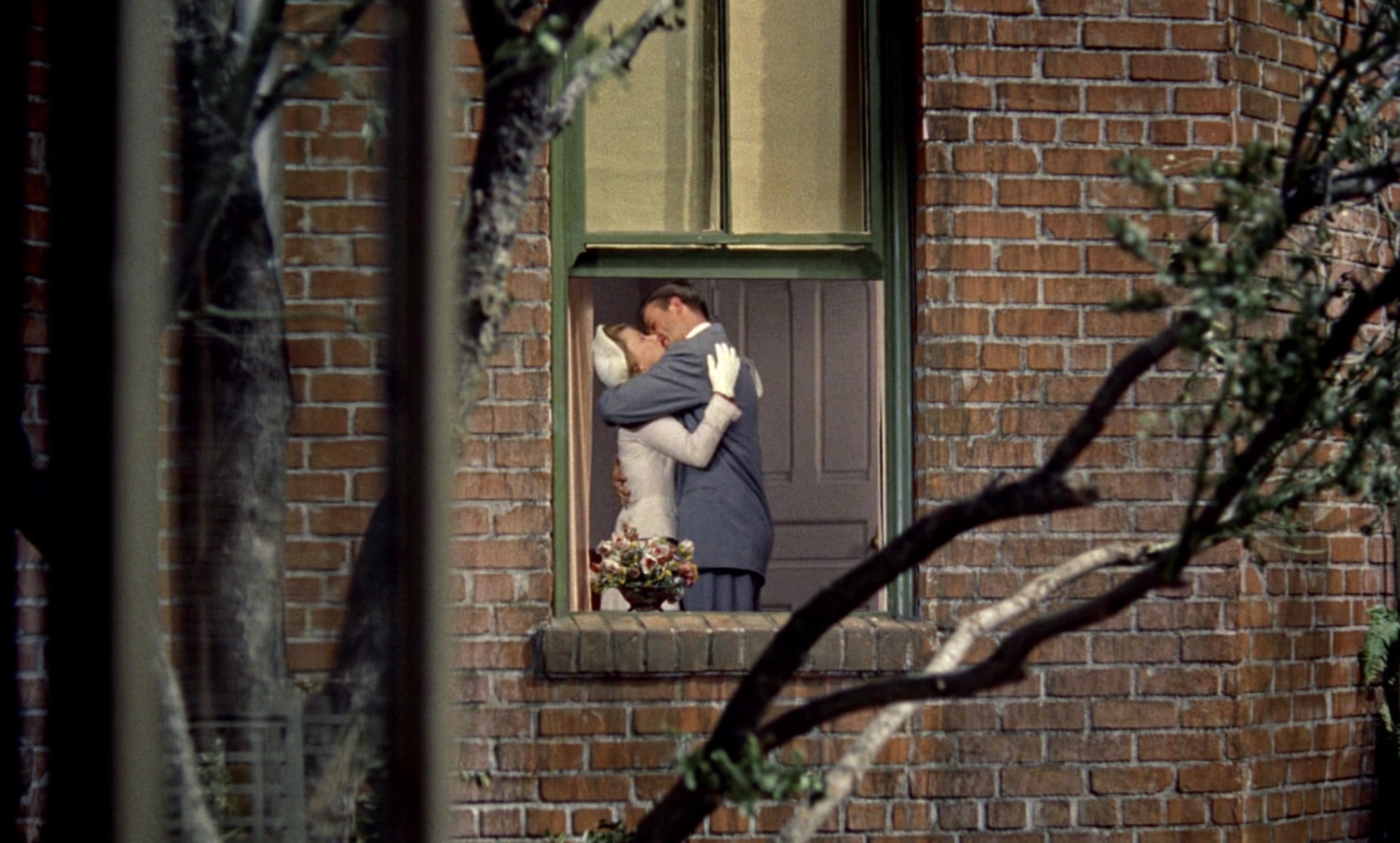
The Newlyweds
Chris: So did you know which one of those threads was going to end up being the murder mystery?
Molly: No, not from that.
Chris: I’ve seen this movie so many times. That’s why it’s so cool to talk about it with you. That’s what I like about writing these things, too. It makes me look at these movies with new eyes, you know? I was like, if I didn’t know, could I tell?
Molly: Well, we see Raymond Burr. I didn’t know for sure. but I figured his character was going to do something. And I sort of assumed murder. But no, I didn’t know a hundred percent, for sure. But after not too long, the way the camera lingers on him, it’s just a weird dynamic between him and his wife. You kind of feel like, okay, that’s who it’s going to happen with. They tee that up.
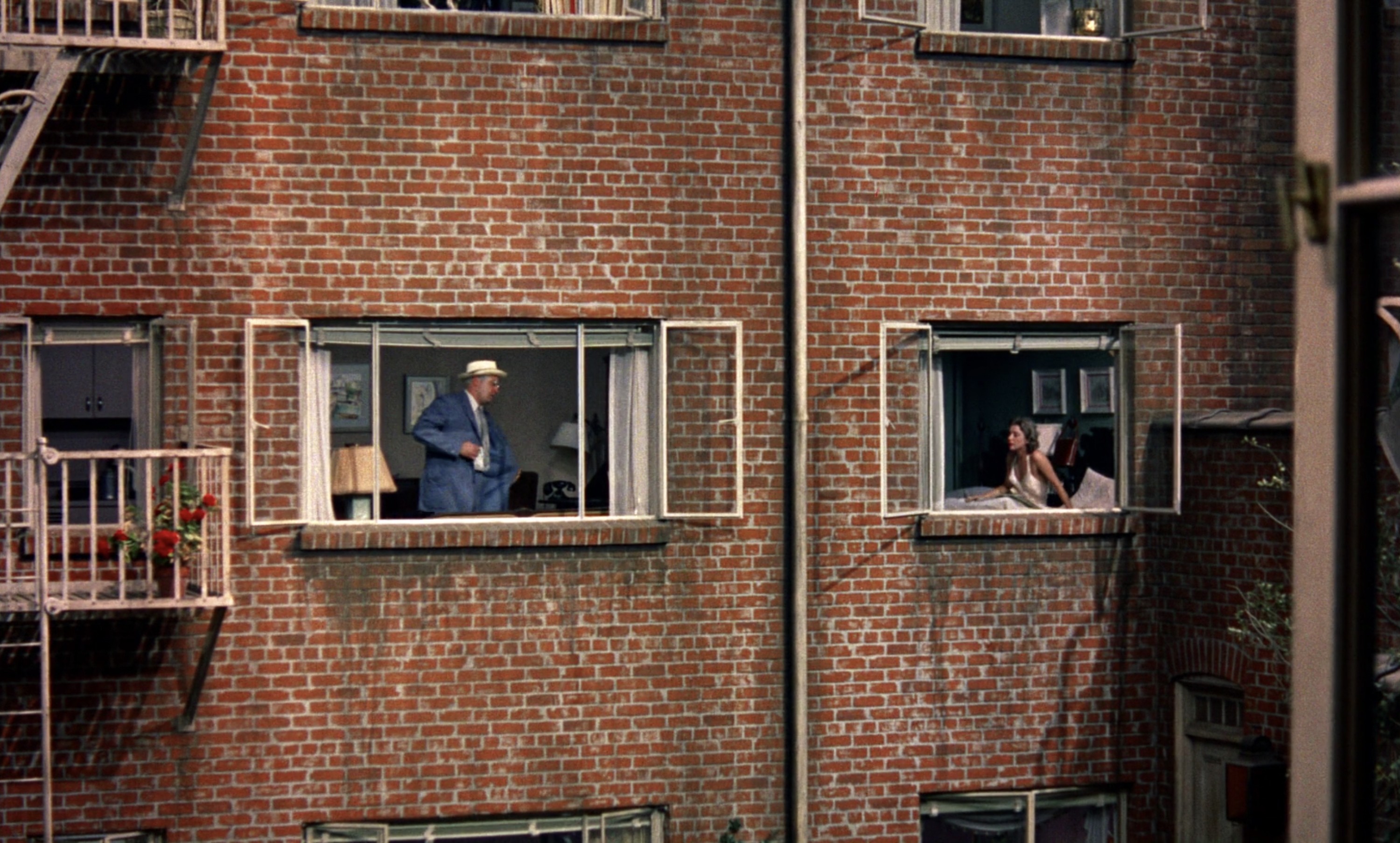
Raymond Burr (left) as Lars Thorwald and Irene Winston as Anna Thorwald.
Chris: One of my all-time favorite lines is “Save us from the over-passionate daughters of the rich!” I say that to myself all the time, in totally inappropriate circumstances. It’s like a personal catchphrase. I sometimes forget where I even got it, but then I heard it this time, and I was like, “Oh, yeah. That’s where I got it.”
Molly: I liked his relationship with Lisa, too, because he had it in his head that it wasn’t gonna work. Everything was too perfect. I liked how I think she definitely wanted to change for him, and she enjoyed that change, and he appreciated it. I liked how they evolved that way. Although, I have to say, one of my notes was the casual misogyny that runs through the whole movie, which was par for the course for the era. But it’s still jarring.
Chris: It is jarring. I think that’s when a lot of kids … uh, younger people watch older movies, they can’t get past that a lot of times.
Molly: So many old movies have a lot of racist and misogynistic and homophobic stuff, things that under the lens of today do not hold up.
Chris: King Kong is my one that I always talk about. King Kong is an amazing movie. It’s groundbreaking, and the special effects sequences still hold up today. But that movie was made in 1933, and in places, it’s just racist as hell. And sexist, too. I mean, it’s not Birth of a Nation racist, but it’s really uncomfortable, the way the natives are portrayed on Skull Island.
Molly: Speaking of special effects, there’s one scene in this film where a helicopter shows up. It’s almost like, where’s the person holding the string to the helicopter? It was so bad. I was like, why is this here? Did it add anything?
Chris: Well, I think you’re right. It’s a bad composite shot. You’ve got the two girls who are in bikinis sunbathing, and then the helicopter comes and hovers over them to ogle them.
Molly: Oh, okay. I wasn’t getting that.
Chris: It probably worked better in 1954, But it’s another aspect of everybody watching each other. What’s the difference between the guys in the helicopter ogling these chicks, and what Jeff and Lisa are doing? But you look at that helicopter, you immediately think it’s wrong. And also, by extension, it’s what the audience is doing when the audience is watching the film. You judge the people in the helicopter, but you don’t judge yourself, and you don’t judge Jeff, even though you’re all in comparable moral positions.
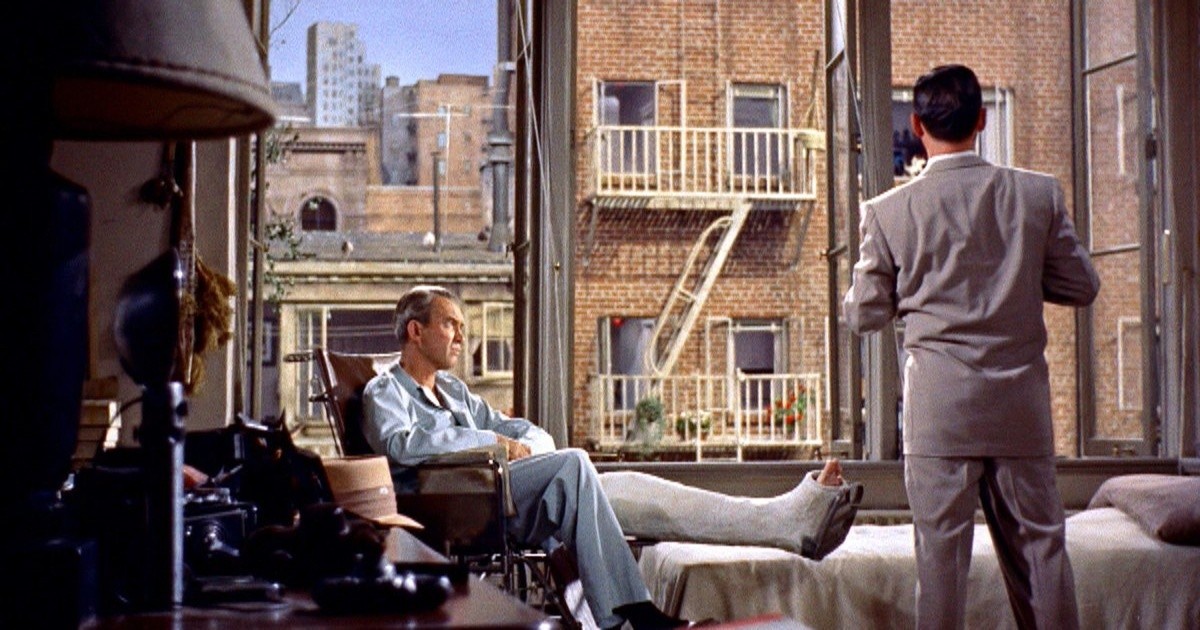
Molly: Well, it’s interesting because Jeff’s the photographer. And so he’s naturally always seeking out compelling visuals. Until they brought up the whole “rear window ethics” thing, I didn’t give it much thought. I mean, you’re living so close to other people and everyone keeps their windows open. So everyone’s doing some of that. And I don’t know, just seemed to me like, that’s what you did back then. And even now, like reality TV, I guess people who are in those shows agree to be in them, but I’ve never been so drawn to that. I mean, there’s some reality TV that’s better than others, but some that’s just that pure voyeurism. A peek inside someone’s life that seems so staged, but is supposed to be real, that didn’t interest me. Whereas this was much more compelling to me because I could relate to it. I used to live in New York, in an apartment building. I felt like I was really remembering that and missing that.
Chris: Where did you live in New York?
Molly: A few different places, but the last place I lived was the East Village, in a 550 square-foot studio.
Chris: I wrote this down. She lives on …
Molly: She lives on 63rd. I remember he said at one point he was on 9th street. So, he was in the Village, and she was probably on the Upper East Side
Chris: He’s in the Village, ’cause next door, he’s got a sculptor, a dancer, and a musician. And he’s a photographer. They’re all artsy.
Never Seen It: Watching Rear Window with Director Molly Wexler (2)
Chris: So, you just directed your first movie …
Molly: It was very different!
Chris: It is different, but this film brings up questions of documentary ethics, as well. What did you take from this, as a newly minted director?
Molly: Well, I had a great appreciation for a lot of the shots, especially at the end. Jeff knows Lars is coming in the door, and they sort of pan down on top of Jimmy Stewart’s face. That was classic Hitchcock in my mind. The way it was lit, and the look in his eye, and the shot from above. I love that shot, maybe because it’s so familiar. I also liked [that] there were so many fade to blacks. Not that fades are especially creative, but I thought it just felt right.
Chris: Hitch uses it as a pacing element.
Molly: And he never lost me. Something else that I really thought was nice was how so much of the score was from the musician who lived in one of the apartments in the courtyard. What a clever idea, not just to play the music, but to have it come from one of the apartments. That’s very realistic in New York. You hear everything, you know? I liked how like the music saved Miss Lonely Hearts, but also it saved the Composer, because there were times when he seems pretty despondent and upset. He definitely seemed to be having his ups and downs. At the end, him hearing how the music saved her probably ended up helping save him, too.
Chris: It ends with him playing the record that he finally got made. What you’re talking about is called diegetic sound. There’s two kinds of sound or music in film: diegetic and non-diegetic. Diegetic means it comes from a source that you can see on the screen, or that is assumed to be in the world. Non-diegetic sound is like the John Williams score in Star Wars. Luke Skywalker can’t hear that music.
Never Seen It: Watching Rear Window with Director Molly Wexler (4)
Chris: This movie is like diegetic everything. He built a little world. The whole thing was a soundstage.
Molly: Oh my God! I swear, I was trying to figure out where that could be. But I was like, that’s so long ago, I’m sure it’s been renovated or torn down or whatever. Wow! That’s impressive.
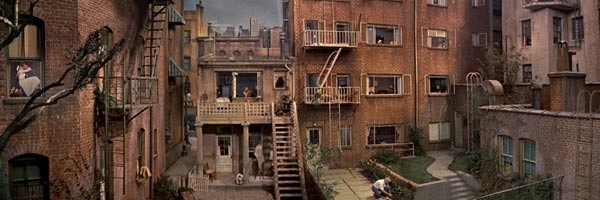
The New York City courtyard set was built in a soundstage at Paramount Studios in Los Angeles.
Chris: Yeah. It’s all one set. You know, what I love about it — and this is my favorite Hitchcock film. Then I’ve got like five or six that are tied for second. You know what I mean? What elevates it to me is, I think, that sense of playfulness that you picked up on. The fact that it’s not just a straight spy thriller. It’s not just a straight suspense film. There’s so much else that’s going on at the same time.
Vertigo, which is the one that film writers and directors and everybody goes on about, and the one that displaced Citizen Kane as No. 1 in the decadal Sight + Sound poll, I’ve just never been a big fan. I think that the undertones of misogyny you’ve picked up on in this one are really foregrounded in Vertigo. But that’s also, I think, what people like about it. Hitchcock’s sort of confronting his own misogyny.
But what I like about Rear Window is the tightness of the construction, how everything fits together so well. Like you said, there’s so many tiny little narratives that sort of get scrunched together to make something bigger. I just love that, you know? I love the simplicity of how all these characters are drawn. Like the musician and Miss Lonely Hearts, their arc is more complete than some sitcom characters that you’ve seen for 10 years.
Molly: And it’s funny, because you have almost no dialogue from them. You just catch glimpses of them, but you learn a lot from those glimpses. What’s interesting is, after the dog gets murdered and the woman who owns him yells “Neighbors are supposed to be friends and take care of each other and not kill the dog!” Everything sort of comes to a head then. They start to solve the mystery, and then you see the neighbors mingling more with each other. The tragedy makes a community. And that’s kind of like the pandemic, where people really are getting to know their neighbors and are finding much more of a sense of community because they’re around more, and they’re out in their yards, wherever they live. Sometimes it does take a tragedy to remind us that we have neighbors, and that then it is nice to know your neighbors and have community.
Never Seen It: Watching Rear Window with Director Molly Wexler (5)